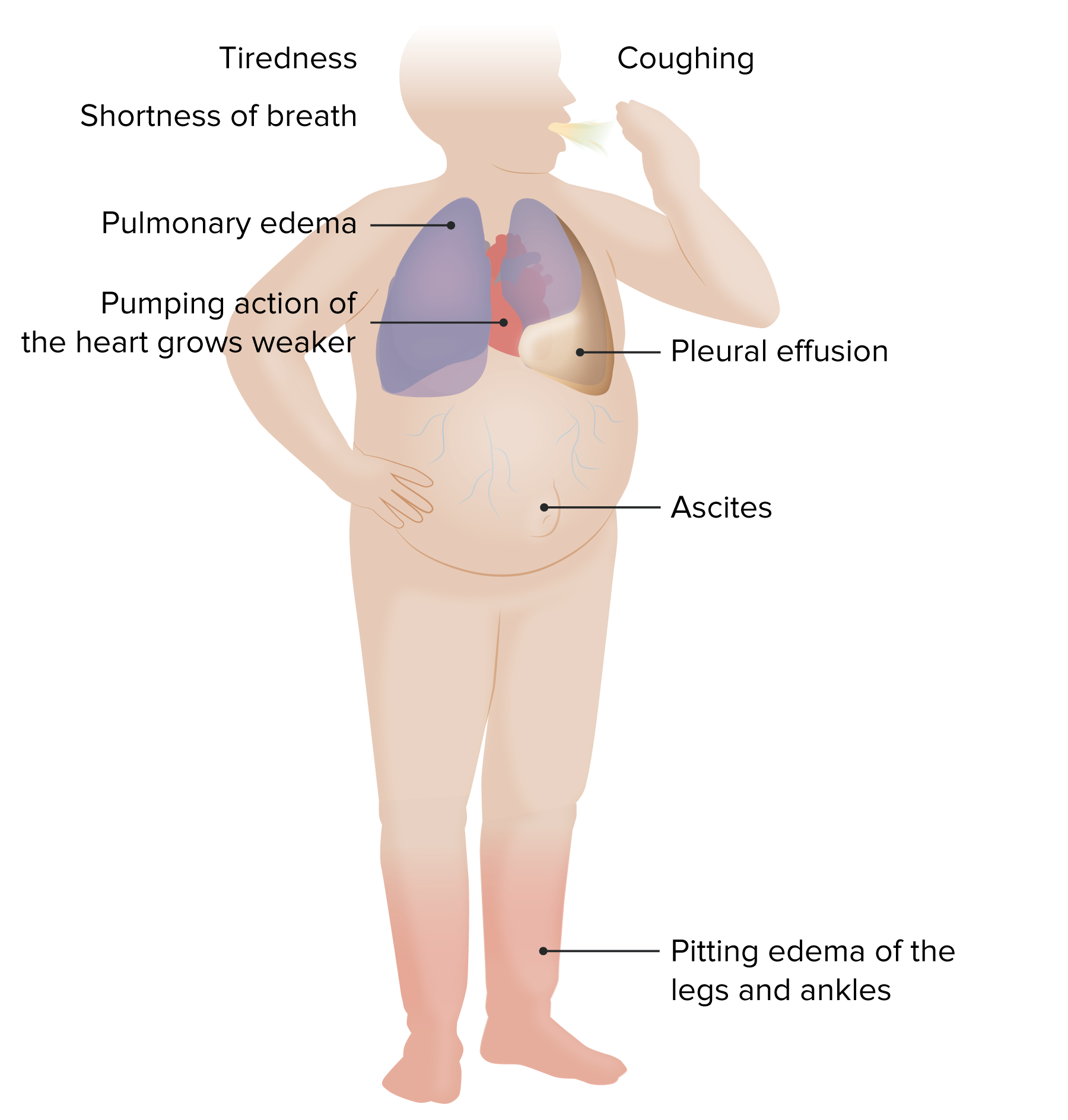Playlist
Show Playlist
Hide Playlist
Cardiac Case: 61-year-old Man with Substernal Chest Discomfort, Shortness of Breath and Diffuse Sweating
-
Cardiac Case 61-year-old Man with Substernal Chest Discomfort Shortness of Breath and Diffuse Sweating.pdf
-
Reference List Cardiology.pdf
-
Download Lecture Overview
00:01 A 61-year-old man has a long history of heavy cigarette smoking, hypertension and hyperlipidemia. 00:06 He experiences severe substernal chest discomfort, shortness of breath and diffuse sweating at 7:00 AM. 00:13 He decides it’s probably indigestion - he takes antacid pill, goes back to bed. 00:18 Five hours later the pain is still present and he finally goes to the emergency room. 00:23 When he arrives he’s a little bit confused, he has cool and clammy skin, his blood pressure is markedly reduced at 85/55 and his heart rate is markedly increased at a 110. 00:34 The rest of his exam is not very remarkable, we don’t hear any murmurs and so forth and there’s no peripheral edema suggesting long standing heart failure. 00:43 All the blood tests are normal except that his kidney test are abnormal. 00:47 The BUN is elevated at 35 and the creatinine at 1.6 and this is not surprising given his long history of having hypertension and probably also his hyperlipidemia undoubtedly he either has hypertensive or atherosclerotic damage to the kidneys. 01:04 What’s important here of course is his marked predisposing factors to cardiovascular disease, the fact that he has symptoms that could be angina but could had been the start of a myocardial infarct and as we’ll see, it was the start of his myocardial infarct. 01:19 He makes a bad decision and takes antacids instead of coming to the hospital. 01:24 He’s blood pressure is very low so he’s borderline shock. 01:28 His skin is cool and clammy, his heart rate is a 110 so this person his heart is not functioning well and his blood test are normal but indeed he already has some renal insufficiency and here is his electrocardiogram. Please take a few moments and think about this. 01:47 In the next slide we will tell you the diagnosis. 01:56 Well, the next slide shows us marked ST segment elevation in leads V1 to V6 and even more worrisome is there is almost no R wave there which means this is a very extensive anterior wall myocardial infarction. 02:11 So we make the diagnosis of anterior myocardial infarction and cardiogenic shock based on confusion; cool, clammy skin; low blood pressure and tachycardia. 02:22 He’s taken to the catheterization laboratory where there’s occlusion of the left anterior descending artery, this’s opened and stented with a drug eluting stent. 02:31 He develops ventricular fibrillations during the catheterization, he's promptly shocked back to sinus rhythm. 02:37 He's taken rapidly to the coronary intensive care unit where he develops progressive shortness of breath and falling blood pressure. 02:45 He gets intubated and placed on a ventilator, there’s intravenous infusion of dobutamine is started to try and get his blood pressure up but it doesn’t have very much effect so he’s brought back to the catheterization laboratory where a small pumping device, the left ventricular impella device is inserted. 03:04 This leads to a normal blood pressure after several minutes but of interest is his urine output is extremely poor, he has a foley catheter, he’s only making 10 cc/hour which suggest there’s been kidney damage because of the cardiogenic shock. 03:19 Over the next three days his arterial blood pressure is maintained with intravenous dobutamine and of course the impella eventually is taken out. 03:28 Unfortunately, the urine output remains low, he's given IV norepinephrine to the drug regimen to maintain blood pressure and an echocardiographic study reveals a left ventricular ejection fraction of only 19%, so this patient is going to face a very long and slow hospitalization. 03:47 There’s a high risk that he will not survive this huge infarct but very often with the modern techniques such as the impella and the drugs we can get somebody like this to survive. 03:58 Having survived, he almost certainly going to have heart failure that’s going to need to be treated.
About the Lecture
The lecture Cardiac Case: 61-year-old Man with Substernal Chest Discomfort, Shortness of Breath and Diffuse Sweating by Joseph Alpert, MD is from the course Cardiovascular Cases.
Included Quiz Questions
A 61-year-old man with a long history of heavy cigarette smoking, hypertension, and hyperlipidemia experiences severe substernal chest discomfort, shortness of breath, and diffuse sweating at 7 AM. He decides that it is due to indigestion and takes several antacid pills before returning to bed. However, 5 hours later the pain is still present, and he presents to the emergency department. On physical examination, he is mildly confused, his skin is cool and clammy, his blood pressure is 85/55 mm Hg, and his heart rate 110 beats/min. His blood tests show a BUN level of 35 mg/dL and a creatinine level of 1.6 mg/dL. A 12-lead ECG shows ST-segment elevation over the V1–V5 leads. Which of the following is the most likely diagnosis?
- Anterior wall myocardial infarction
- Posterior wall myocardial infarction
- Inferior wall myocardial infarction
- Interventricular septum rupture
- True ventricular aneurysm
A 61-year-old man with a long history of heavy cigarette smoking, hypertension, and hyperlipidemia experiences severe substernal chest discomfort, shortness of breath, and diffuse sweating at 7 AM. He decides that it is due to indigestion and takes several antacid pills before returning to bed. However, 5 hours later the pain is still present, and he presents to the emergency department. On physical examination, he is mildly confused, his skin is cool and clammy, his blood pressure is 85/55 mm Hg, and his heart rate 110 beats/min. His blood tests show a BUN level of 35 mg/dL and a creatinine level of 1.6 mg/dL. A 12-lead ECG shows ST-segment elevation over the V1–V5 leads. He is treated promptly in the catheterization lab, and then he is transferred to the coronary ICU. In the ICU, he develops progressive shortness of breath, falling blood pressure, and confusion. Which of the following is the best next step in the treatment of this patient?
- Intubation and placement on a ventilator
- Intravenous fluid administration
- Dobutamine administration
- Norepinephrine administration
- Impella device insertion
Customer reviews
5,0 of 5 stars
| 5 Stars |
|
5 |
| 4 Stars |
|
0 |
| 3 Stars |
|
0 |
| 2 Stars |
|
0 |
| 1 Star |
|
0 |




